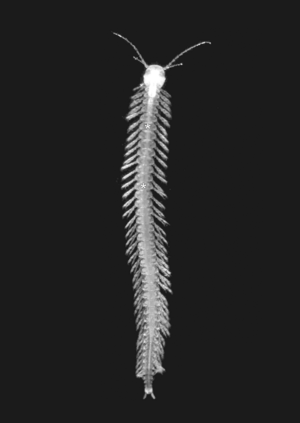Remipedes facts for kids
Quick facts for kids RemipediaTemporal range: Pennsylvanian to Recent
|
|
|---|---|
 |
|
| Speleonectes tanumekes | |
| Scientific classification | |
| Kingdom: | |
| Phylum: | |
| Subphylum: | |
| Class: |
Remipedia
J. Yager, 1981
|
Remipedia are a special group of crustaceans. They are blind and live in dark, underground water systems. These systems are called aquifers, which are like natural underground rivers or lakes.
You can find these tiny animals in salty water. They live in many ocean areas around the world. This includes places like Australia, the Caribbean Sea, and the Atlantic Ocean. They prefer warm, subtropical waters.
Contents
Discovering Remipedia
The first remipede ever found was a fossil. It was named Tesnusocaris goldichi. This fossil was discovered from the early Pennsylvanian period. This means it lived a very long time ago! Since 1979, scientists have found at least 17 living species of remipedes.
Body Features of Remipedia
Remipedes are small, usually about 10 to 40 millimeters long. That's about 0.4 to 1.6 inches. They have a head and a long body. This body can have up to 42 similar parts, called segments.
Each body segment has swimming appendages on its sides. These help the animal move. Remipedes swim on their backs and are generally slow.
Special Mouthparts
These creatures have fangs. These fangs are connected to special glands. Scientists are not sure if these glands make venom or digestive juices. It's a mystery they are still trying to solve!
Ancient Body Plan
Remipedes have a very simple body design. This suggests they might be a very old group of crustaceans. They could be similar to the first crustaceans that ever lived.
Brain and Senses
At least one species, Godzilliognomus frondosus, has a well-developed brain. It has a very large area for smell. Animals that live in dark places need to find food using their sense of smell. The complex brain of remipedes suggests they might be closely related to more advanced crustaceans.
Remipedia and Insects
Recent studies on their genes show something interesting. Remipedes might be the closest relatives to insects among all arthropods. This means they share a common ancestor with insects from a very long time ago.
See also
 In Spanish: Remipedios para niños
In Spanish: Remipedios para niños

